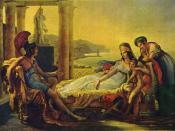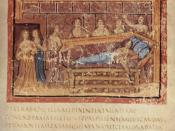Driven by fate to seek a new land for himself, his family, and the survivors of Troy, Aeneas abandons Carthage and his lover Dido. His pietas, his sense of devotion to gods and his people, is nowhere more evident, and nowhere more destructive.
"The story of Dido's tragedy has always been the best known part of the Aeneid. It was a favoured theme in twelfth century French romances; in Chaucer's House of Fame it has twice as much space as the rest of the Aeneid; Marlowe's Dido, Queen of Carthage is among the most familiar dramas on the subject, and the operas of Purcell and Berlioz are well known. It has been said that Dido is the only character created by a Roman poet to pass into world literature." --R.D. Williams, The Aeneid of Virgil, Books 1-6. New York, 1972, p. 332.
Valahfridus (Wilfried) Stroh has held the rank of professor of classical philology at the University of Munich since 1976.
He is particularly interested in Roman love poetry, oratory, prosody, and in Neo-Latin. Professor Stroh is fond of using Latin in his writing and conversation and, when he encounters young people who are eager for learning, he strives to instruct them in the art of spoken Latin. He is, with the Czech musiciaJan Novák, the founder and editor of LVDI LATINI, which provides a venue for Latin art and music.
He has written the following books: Ovid in the Judgement of Posterity, Roman Love Elegy as Courtship Poetry, Arrangement and Strategy (on Cicero's Court Speeches), Specimens of Latin Versification, Love on the Learned Mount, and various Apocrypha. He has for the past fifteen years directed the Society for the Staging of the LVDI LATINI, Inc.
Professor Stroh's performance of Aeneid Book IV was recorded digitally on April...


